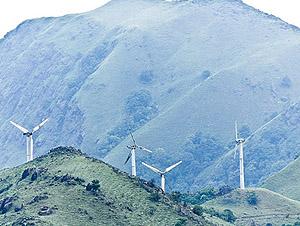India’s green energy promises
Windmills on Talakaveri Top in Karnataka, India. (Image by Flickr user Nikhil Verma (CC: by-nc-sa))
The following is a partial transcript; for full story, listen to audio
Story by Miranda Kennedy, PRI’s “The World”
As climate negotiators meet in Copenhagen, polls suggest that the US is one of the few countries where concern about climate change is falling. A possible reason: Temperatures in North America have actually been on the cool side in recent years.
The UN’s weather agency presented that finding at the international summit on climate change. The bigger picture is more sobering, though. The figures show that globally, the current decade has been the warmest since records began 160 years ago.
India has been especially vulnerable to global warming. That fact is leading the Indian government to soften its position on greenhouse gas emissions.
Earlier this fall, when there was unprecedented flooding in southern India, environmentalists took to the TV talk shows to try to stir people up about climate change.
“With climate change, our food security is at risk, our health security is at risk, our water security is at risk,” said Bittu Sahgal, editor of the magazine “Sanctuary Asia.”
Sahgal says India’s long coastline and proximity to the Himalayan Mountains make the country especially vulnerable to the impacts of rising sea levels and melting glaciers. But he worries that few Indians understand the seriousness of the problem, and that the government hasn’t done enough to raise the alarm.
“The prime minister should get on the air, and he should talk to farmers, he should talk to the urban and rural poor and he should tell them what climate change is,” said Sahgal. “If there was an external threat from another country that’s what he would do.”
Government officials, though, say such criticism is unfair.
“The idea that India’s not willing to do anything is just completely wrong,” said Montek Singh Ahulwahlia, the prime minister’s chief economic policy maker. “Because in our own national action plan for climate change, we’ve said we must do something.”
For starters, says Ahulwahlia, there will be a statutory requirement to purchase a percentage of electricity from clean sources, and a program for developing solar thermal electricity.
The legislation would ensure that India gets 20 percent of its electricity from renewable sources with ten years. It would also set the country’s first mandatory energy efficiency standards for vehicles, appliances and buildings.
Environment minister Jairam Ramesh says efforts like these show that India is doing its part on climate change.
Since announcing the new energy policies, Ramesh has become a target of criticism at home, with many legislators accusing him of selling India out to the West. But the promises actually come with a big caveat: India wants developed countries to help fund the transition to a lower-carbon economy. And that could be a big sticking point, especially since India continues to refuse the binding emissions caps that some in the West are demanding.
But without funding aid, India’s homegrown green energy industry may continue to spin its wheels. Government scientists have been researching clean technologies in a sprawling solar development facility outside Delhi for more than 30 years. India created a ministry devoted to renewable energy back in the 1970s, but in all that time, researchers haven’t made any major breakthroughs.
Indian researchers have helped improve solar heaters and lanterns for use in rural areas. Wind power is also taking root in some parts of the country. But while other countries, from Germany to Japan, have made big strides in clean energy, India has little to show for its efforts. And it still depends on highly-polluting coal for more than half of its electricity.
Still, many in India believe that the country is already on a less polluting path than industrial nations took.
“Our energy consumption is increasing at a much lower rate than our growth, which is a very good sign,” said Chandra Bhushan, a climate researcher with the Center for Science and the Environment in Delhi.
For that, Bhushan partly credits the Indian government, which charges industry some of the highest energy rates in the world in an effort to conserve resources.
He says Indian companies must also report their energy use. “India was probably the first country in the world to demand energy data disclosure in the financial reports. Every company in this country has to say what they’ve done for conservation of energy.”
Bhushan agrees that there’s plenty of room for improvement, though. Roughly a third of India’s electricity is lost to theft and leakage. And while India’s per capita carbon emissions are among the lowest of the major world economies, that’s because more than half the population has no access to electricity at all.
It’s inevitable that will change. India is now promising that many of those hundreds of millions will get their power from renewable sources. Much of the rest of the world is hoping the country makes good on that promise.
PRI’s “The World” is a one-hour, weekday radio news magazine offering a mix of news, features, interviews, and music from around the globe. “The World” is a co-production of the BBC World Service, PRI and WGBH Boston.
